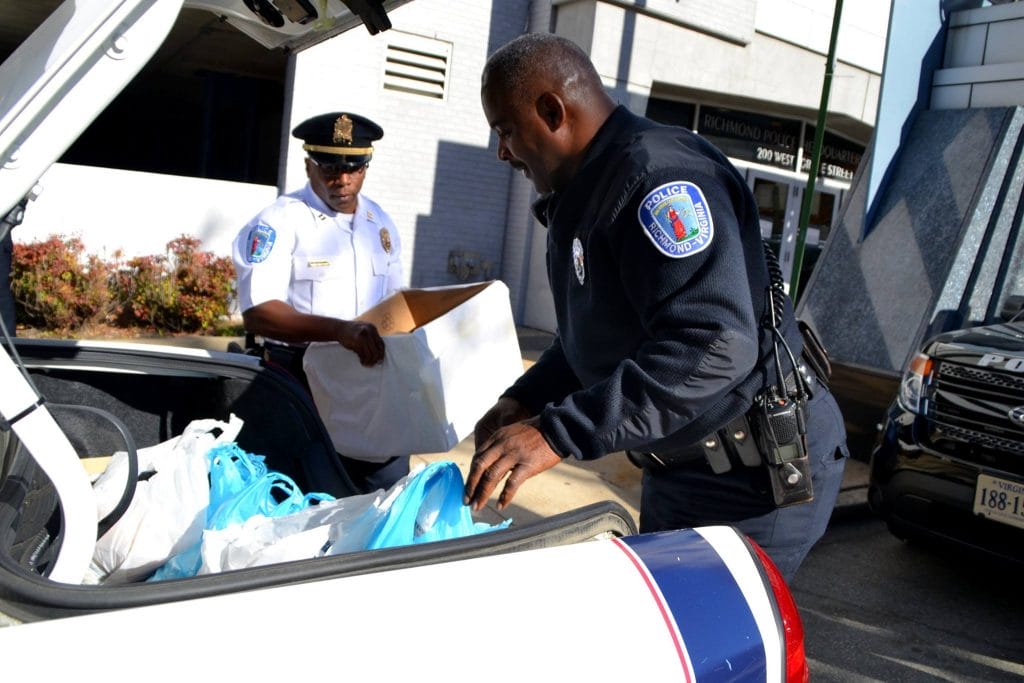Richmond police department experiences officer shortage, spike in crime

Photo courtesy of Richmond Police Dept. Facebook page.

Richmond Police deputy chief Steve Drew had just returned to the station from Southside Richmond, according to RPD spokesman Gene Lepley. The area was the site of a double shooting last Wednesday that left one victim with life-threatening injuries.
“We just got notified of an individual who’s in the hospital who unfortunately succumbed to his injuries earlier this afternoon,” Drew said. “That puts us at 58 murders.”
As Drew put it, that’s 58 too many.
The city’s homicide rate is higher than it has been in a decade, and the Richmond Police Department is simultaneously experiencing a significant officer shortage.
Drew said the department is about 70 to 80 officers short of its goal of 750 and the shortage has forced the department to prioritize certain violent crimes over other offenses.
“We have to remember that our number one priority is when a citizen picks up the phone and calls for service that we have an officer there to meet that need,” Drew said.
The shortage was the focus of a series of appeals by former and current RPD officers for increased funding at city council meetings late last month, he said.
“I have to let crime sometimes pass because it’s not prudent to even interact with it, because we don’t have backup,” said Gene Carter, an officer who served Northside Richmond for 20 years. “My backup is across the city, if there even is someone else available that can come help me. That is pitiful.”
The department has also been forced to cut back on nonessential programs that Drew said have been instrumental in the city’s year-after-year decline in violent crime.
“We’re still going to make sure the core services are provided,” Drew said. “But to be the department we have become — to see the crime reduction that we’ve seen over the past ten years — it’s because of all the outreach we’ve done in the community.”
For example, Drew highlighted community policing tactics, special units for homeless and other marginalized community outreach, walking beats, and open forums to help the community understand why the police work the way they do.
These and other programs have been replicated in countless police departments across the country, which is a stark reversal of a reputation the city attained just 20 years prior.
“When I came here in 1993,” Drew said. “We had 160 murders in this city of just under 200,000 people. That’s off the chart. We made national news.”
In the past five or six years, however, that number dropped to an average of roughly 40 homicides per diem.
“We have a list of people that want to come and join this police department,” Drew said, adding that the department’s innovative approach to combatting crime and the opportunity for fast-paced experiential learning is unique to city policing.
“Bringing in officers isn’t our problem,” Drew said. “We have to have the funds to pay for them.”
Richmond Police Chief Alfred Durham petitioned the council’s public safety committee last month to recommend an $1.8-million appropriation for an additional class of academy recruits.
Drew underscored the necessity of the funding. He said the academy just enrolled a class of recruits a few weeks ago. They joined another class already scheduled to graduate mid-February. A third is scheduled for enrollment earlier that same month.
“So for about three weeks, we’ll have three recruit classes in our academy at the same time,” Drew said. “That’s never been done before.”
The classes average 20 recruits each, so the department should reach its goal of 750 sworn officers next year.
“Here’s the thing,” Drew said, “once we get an individual hired, it’s still another eight months before they’re prepared and out on the street on their own.”
Additionally, Drew said retirements and high turnover could blunt those gains.
“I don’t want to have a recruit come here,” Drew said. “Work three years, get a tremendous amount of experience here — compared to what they would get in the same timeframe in other jurisdictions — and then leave.”
Drew said he understands the difference a higher salary and a take-home car can make, and encouraged officers to make the best decision for them and their families, and he said the department needs to provide more competitive salaries and benefits so that officers aren’t forced to make those decisions.
The department’s also been forced to cut back on staffing certain public events, but Drew stressed that larger events like the Grand Illumination would still see a proportional police presence.
These events are just one of the many complicating factors presented by the city’s rising population and increased commercial activity. Drew said even the department’s current hiring and retention goals might be insufficient to handle it.
“As our city grows and flourishes, and there are more and more demands on a police department, we may talk about increasing that staffing from 750 to 800,” Drew said.
Jim Thomma, Contributing Writer


